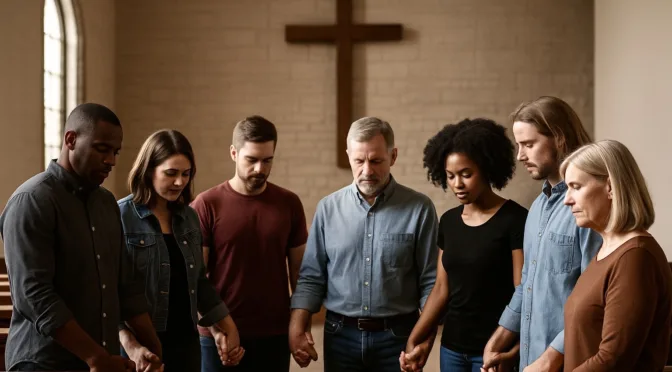The early Church was built on a living foundation: “having been built on the foundation of the apostles and prophets, Christ Jesus Himself being the cornerstone” (Ephesians 2:20, NASB). These men and women were not ornamental — they were essential to the growth and strength of the Church. Yet how they moved and ministered often raises questions for us today.
Were apostles and prophets called to stay planted in a single church? Or were they called to move continually? And should they even have a home church if their mission requires constant travel?
Let’s walk slowly and biblically, for God is not a God of confusion but of peace (1 Corinthians 14:33, NASB).
1. Jesus’ Ministry: Relationship and Movement
Jesus Christ — the Chief Apostle (Hebrews 3:1) — gives us the first and clearest model.
He ministered through deep relationships:
- He called the Twelve to walk with Him (Mark 3:14).
- He ate with sinners and built trust (Luke 5:29–30).
- He wept over Jerusalem, showing the depth of His love (Luke 19:41).
Yet Jesus was also continually moving:
- “Jesus was going about all the cities and villages, teaching in their synagogues and proclaiming the gospel of the kingdom” (Matthew 9:35, NASB).
- “The Son of Man has nowhere to lay His head” (Matthew 8:20, NASB).
- “I must also preach the kingdom of God to the other cities, because I was sent for this purpose” (Luke 4:43, NASB).
Jesus was rooted in love but ready to move wherever the Father sent Him. He did not settle in one place permanently because His mission was to reach the lost, to proclaim the Kingdom, and to prepare the way for the Church.
The apostles and prophets would follow His model.
2. Apostles and Prophets in the Early Church
The word apostle (ἀπόστολος, apostolos) means “one who is sent.” The word prophet (προφήτης, prophētēs) means “one who speaks forth” by inspiration. Both callings imply movement and message — to go where God sends and to speak what God says.
Apostles Moved with Purpose
Paul’s life is a clear picture:
- Sent out from Antioch after prayer and fasting (Acts 13:1–3).
- Traveled from Jerusalem and round about as far as Illyricum (Romans 15:19, NASB).
- Returned to his home church to report what God had done (Acts 14:27).
Peter, John, Barnabas, and Silas also moved widely. They built churches, appointed elders (Titus 1:5), and laid foundations.
Apostles were not tied to one congregation. They were tied to the mission of Christ.
Prophets Strengthened and Encouraged
Prophets like Agabus traveled from Judea to Antioch (Acts 11:27–28) and from Jerusalem to Caesarea (Acts 21:10–11).
Judas and Silas, called prophets, traveled to Antioch and “encouraged and strengthened the brethren with a lengthy message” (Acts 15:32, NASB).
Prophets built up the Church wherever there was need. They were both local and itinerant, moving as the Spirit led.

3. Did Apostles and Prophets Have a Home Church?
Yes — but not in the sense of being locked into one location.
Paul and Barnabas had Antioch as their sending church (Acts 13:1–3). It was where they were known, prayed for, and commissioned. It was where they reported back (Acts 14:27).
A home church meant:
- Spiritual covering — prayer, accountability, wisdom.
- Fellowship — a place of encouragement and growth.
- Discernment — confirming the leading of the Holy Spirit.
- Provision — at times practical support (Philippians 4:15–16).
But it did not mean:
- Restriction to one local ministry.
- Settling permanently into one congregation.
The home church was a wellspring, not a leash.
4. Rootedness and Readiness: Both Are Needed
Some today say apostles and prophets must settle permanently in one church, citing Jesus’ emphasis on relationships. But remember — Jesus moved continually according to the Father’s will.
Likewise, apostles and prophets must be:
- Rooted — in love, humility, accountability, and fellowship.
- Ready — to go where the Holy Spirit leads.
They build relationships deeply, but they are not called to stay comfortable. They are called to equip the saints, “for the building up of the body of Christ” (Ephesians 4:12, NASB).
Apostles and prophets belong to the universal Body, sent not just to their own, but to all who will receive the Word.
5. Why This Matters Today
Without a home church:
- Apostles and prophets can become isolated and unaccountable.
- They risk drifting without spiritual family.
Without readiness to move:
- They can become stagnant.
- They miss the calling to reach and strengthen the wider Body.
Both are needed: rootedness in a local body and readiness to obey the Spirit’s call.
This guards against pride and independence while releasing the fullness of their calling.

6. How Does This Look Today?
In 2025, whether in a non-denominational church or a denominational setting, apostles and prophets must walk carefully and biblically.
In a Non-Denominational Church:
- Apostles and prophets often arise organically, recognized by their fruit rather than formal titles.
- They should remain submitted to church leadership and known among the people.
- A home church should commission them through prayer and fasting (Acts 13:2–3), maintaining ongoing relationship and accountability.
- As they travel and minister elsewhere, they regularly return to their home church to report, refresh, and reconnect.
- Healthy churches release them, understanding they are gifts to the whole Body, not just their local assembly (Ephesians 4:11–12).
In a Denominational Church:
- Many denominations have formal structures for recognizing and sending leaders.
- Apostles and prophets may operate under different titles — sometimes as church planters, missionaries, or overseers.
- They still must be rooted in a local congregation and affirmed by trusted leadership.
- Movement is often more structured, but the heart remains the same: relationship with a home body, readiness to serve wherever God leads.
- Accountability may involve multiple layers, such as local pastors and regional leaders, ensuring both freedom and spiritual safety.
Across both models, the essentials are:
- A clear home base — not as a limitation, but as a fountain of strength and covering.
- Spirit-led movement — not driven by ambition, but by the voice of God.
- Mutual trust — the church trusts the sent ones, and the sent ones honor their sending church.
In short, apostles and prophets today must balance belonging and being sent — deeply connected, yet joyfully obedient to the Spirit’s call. The New Testament model is timeless, even in our modern structures.
7. Final Thoughts
Apostles and prophets need a home church — and they need to move when God says move.
This is the model of Jesus Himself. Deeply relational, radically obedient. He calls His servants to the same path.
If you are discerning a calling to apostolic or prophetic ministry, hear this: God plants you in fellowship to nourish you — and He sends you out to be His hands and feet. Do not resist either. Stay rooted. Stay ready.
“Therefore, my beloved brethren, be firm, immovable, always excelling in the work of the Lord, knowing that your labor is not in vain in the Lord” (1 Corinthians 15:58, NASB).
A Prayer for the Called
Father, we ask You to raise up apostles and prophets in our generation — men and women rooted in love, steadfast in truth, and obedient to Your sending. Plant them in strong fellowships. Fill them with boldness to go where You send. Let them serve not in their strength, but in utter dependence on You. More of You, less of us, O Lord. Teach us to walk in step with Your Spirit, anchored in Your Word, and aflame with Your purpose. In Yeshua’s name we pray. Amen.
⸻

P.S. A Word About Today’s Church Culture
In today’s churches — whether denominational or non-denominational — visitors are often viewed as potential members. Growth strategies, assimilation systems, and local community focus shape the atmosphere. But what happens when an apostle or prophet, sent by God, comes not looking for a home but carrying a word or a mission? Often, they are quietly overlooked:
- They don’t fit the membership model.
- They aren’t long-term attenders, so little relational investment is made.
- They are seen as outsiders, not trusted contributors.
- Their divine calling remains unseen in systems focused on stability.
This reality creates real tension for modern apostles and prophets, who are called to strengthen, edify, and establish the Church.
Practically, this means:
- Expect Resistance — Like Paul in Acts 9:26, acceptance may not come easily.
- Walk in Humility — Seek the open hearts and houses God prepares (Luke 10:5–6).
- Build Strategic Relationships — Focus on friendships and networks that value fivefold ministry (Ephesians 4:11–12).
- Anchor in a Strong Home Church — A sending church becomes vital for encouragement and covering.
- Be Faithful Despite Reception — Jesus said, “Shake the dust off your feet” (Matthew 10:14, NASB). Faithfulness is measured by obedience, not applause.
Today’s culture may not easily make room for traveling apostles and prophets — unless they’re celebrities. But God still sends them. The true call demands humility, persistence, and a heart set on the approval of God, not men.




